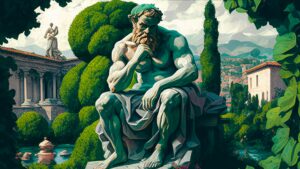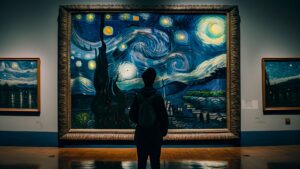
The Beekeeper, The Artisan & The Shepherd – Transylvanian Bedtime Story Text
And now, allow my voice to take you back in time to Transylvania. The year is 1921, and it’s a beautiful spring morning. You find yourself in this often misunderstood place. Most people associate Transylvania with a very famous Gothic novel written by a man called Bram Stoker, but this isn’t what we will be talking about tonight. This afternoon is a sleep story, and you are going to discover Transylvania in a very different way all for yourself. You’re walking along a little country lane way. The birds are singing, the gentle morning sun shines down upon your face. This guy is a rich deep blue, and the smells that emanate a wonderful new stand still for a moment, and take a few big deep breaths filling your lungs with this Ceol. Soon, you turn a corner, and the view that greets you is unlike anything perhaps that you have ever seen. The majestic snow-capped Carpathian Mountains are far away in the distance.
But even this far away from them, they look huge and immense. Rich Greenfields lead up to the mountains, and all around you there is a flourishing of life – not human life, but animal life. In fact, you’re pretty sure you’re the only human around for miles. Allow yourself to feel calmed by this – this feeling of being away from it all, in this other time, in this otherworldly place. This is a place that dreams are made of. You walk and walk, feeling the vicar of being at one with nature. Soon, you come to what looks like a little garden. There is a little wooden gate, and yes, there is a beautiful little cottage. Smoke comes from the chimney, and the smell of burning wood fills the air. You see a man tending to something in the garden. He notices you here and smiles and waves to greet you. You immediately feel safe here – the man seems so friendly.
He is quite elderly, with Buddy Holly eyes and a giant, warm, embracing smile. He walks over to you and asks you what you’re doing here. You inform him that you’re enjoying the nature of this majestic place. He invites you into his garden, and as you enter the garden through the little wooden gate, you notice that what he was tending to was hundreds and thousands of bees. This man is a beekeeper. He beckons for you to take a seat, and you do. He then produces a wonderful, more planned tea, and he offers you a little bit of honey to sweeten it – a Transylvanian delicacy, he tells you. He starts to talk to you. It just so happens that he speaks your language fluently, and you are very interested to learn about his life. He says, ‘I have always loved nature with its incomparable beauty. Ever since I was a little boy, I liked to roam the world and listen to the birds chirping in unison. But of all the wonders of nature, I like these little beings the most.
They are the most connected to nature and the most beneficial to it. Very early in my youth, I started to take care of hives, and to this day, at 76, I still do this job with very much love and passion. Us Romanians, we inherited this vocation from our ancient ancestors, and it was passed onto the descendants as one of our most cherished teachings. Can you imagine those people thousands of years ago doing the exact same thing that I do today? In the winter, when the time is monotonous, I look forward to the coming of spring so that I can again see the bees flying over the vast plains adorned by the spring flowers. But invigorate you to life. They seem to make only cool, urging us to fully enjoy all of creation. And as I said before, the spring is where the beautiful pastoral adventure begins, and when I take my bees to the extensive rapeseed crops, there they start collecting honey and pollen and dust. The beekeepers rejoice together with them and live in gratitude for every day blessed by this son. A little later in the spring, during May, the scents of the acacia forests in the western plain of Transylvania await us.
You sit and listen to this man, and you see in his eyes the great joy she takes in nature, in all that is around him. He continues, “We come in the heart of the acacia forest and let ourselves be consumed by the scent of these wonderful white flowers. It’s like each flower exudes love and good cheer.” And he reminds us how gentle and elegant nature is. “That night when we share the same bed with our wonderful bee friends, I can hear the buzzing all night and we fall asleep surrounded by the smell of freshly collected nectar and pollen, now stored in each of their tiny rooms. In the morning, we are woken up by the multitudes of birds, each singing in their own individual note, but the Cuckoo is the one that makes its presence felt the most. Its distinct sound wakes us up from our sweet sleep, and when you listen to it, it seems to help you forget all your worries, calming the mind and the soul. At the end of May, acacia flower season ends, but we are soon on the way to a new adventure. We move many miles with our hard-working bees towards the majestic mountains of Romania. Up there, we enjoy the fresh air, the vast fir and Linden forest, while our bee friends equally begin to explore every Mountain Ridge, collecting a delicious drop from every raspberry or blackberry encountered during the flight. And so, the day ends in the mountains. At dusk, each bee flies back to its huddled house to rest in the silence of the summer night, after a full day of working in the bright sunlight.
Night also seeks to retire to my bed. A thought comes to me while I’m getting ready for bed. I think about not being visited by the master of the forest named Marsh Martin or old Martin to you. You know we have a lot of bears living here, but the night brings me great peace. All I can hear are the steps of the deer going down to the spring to enjoy the crystal clear water that flows abundantly towards the valley. Somewhere over the hills, you can still hear the barking of the Carpathian dogs guarding the shepherds’ flocks of sheep. As we know, old Martin the bear and his cousin the wolf still come around from time to time. And again in the morning, I wake up to the song of the birds and the buzzing of the bees, which once again bring me into another day of glorious work. Once I step lightly through the fresh morning, all I feel is peace and quiet that lives within me through all my days.”
You see yourself sitting and listening to this obviously very wise man. Perhaps you feel completely enamored by the level of concern and peace that this man displays. You feel warmed by his graceful energy, and you feel ready to continue your work through this amazing place. You say goodbye to the beekeeper; he gives you a little jar of honey, and off you go. The sun is getting higher in the sky now, and you decide to look for shade. You arrive at a beautiful little village. This village has such stunning architecture. It is in the Saxon style of architecture that is very well-known throughout all of Transylvania. Since the Middle Ages, Austrian and German people have settled in this region, and with they brought their building style. Their legacy can still be seen today. But this is 1921, and so many people from those countries still live here.
You walk through the village, women smile and greet you, walking through the village themselves with their little children, going about their daily work. Once again, you feel so welcome here. Eventually, you see what looks like a little store. Curiosity gets the better of you and you walk up to the humble wooden little building. You look through the window and you see an elegant looking lady sitting behind the Potters wheel with long flowing grey hair. As you look at her, she still hasn’t seen you and that she works on her pottery. She looks deep in meditation, completely consumed by what she is doing. You knock lightly on the glass and the woman gently opens arise.
She sees you now, and her eyes light up, and with a wave of her heartily covered hand, she invites you. When you open the door and step into this other world, it seems the smell is beautiful in here. The woman is burning some sort of oil, and she has a fire burning in the corner of the room. She has a little dog and a little cat, and both of them look up at you with curious eyes. The woman asks you to sit, and once again, you are served some wonderful plant tea sweetened with honey. The woman asks you what you are doing here. You tell her, and she seems eager to share her life with you, and so do you listen. “I would like to welcome you to Transylvania. This place is a special place, this is my home and has been my family’s home for generations. This wheel that I make my work on has been in my family for hundreds of years. Here in Transylvania, we have a deep connection to the Earth around us, to our land. We live from it, and we treat it with the utmost care and respect. We love our home, we love this place. You see all my work done around this world.” The woman points to fine pieces of pottery, water jugs, plates, warm manner of finely crafted pottery. “All of this work I made with my very own hands, this wheel, and the Earth, it’s that simple. One of the things I love about life here is the simplicity.”
I once went to a city, and there I saw people consumed by so many things that didn’t really matter. What is important to us as humans, we must ask ourselves that question: what do we want from life? Do we want things, non-essential things, manufactured things? What do you want? Beauty that comes from the Earth, objects that will last, and nourishing relationships? Care for others, care for ourselves? For me, this place offers me that. Allow me, if you will, to show how I work. The woman begins working the wheel, and as she does, her graceful and elegant hands gently manipulate the wet piece of clay into different shapes. Gradually, the sheep moulds into a ball, and perhaps as you watch this process, you feel more and more calm as the woman manipulates the ball, adding water bit by bit and finessing this book into something so beautiful and completely made by human hand.
After she has finished, the artisan looks up at you and then her piercing blue eyes. You see decades of wisdom on this so that it understands what it is to live in communion. Weird in the chair, this place perhaps is nourishing you in a very deep and profound way. And now, you decide that you would like to continue your journey. You bid goodbye to the woman, and she hands you a little clay jug. You try to offer her something for it, but she will not have it. This is a gift from one human to another. You walk through the rest of the village, witnessing the happy townsfolk all working together. The thought strikes you that humans, when we work together, we are at our best. As you leave the village, you start back on a little road. People on horses and carts pass by, and the sun is now out.
A place where it’s not too hot but not too cold. In fact, it’s just perfect. Still, the majestic Carpathians are in your line of sight, and the views of the beautiful Transylvanian churches dotting the landscape are phenomenal. You see an eagle soaring overhead. You are inspired by this graceful bird of prey, so elegant, doesn’t rico, and yet so humble. Eventually, you come to a little field, and in that field, you see there are many sheep. Into next year, though she is a little wooden heard, you have been told not to go too close to cheaper because the Carpathian Shepherd dogs can be quite protective. But then you see the kindly looking shepherd, and he waves for you to come over. You walk through the field, the rich green grass beneath your feet, the friendly looking sheep taking you in as you approach the shepherd.
And you can see that he is busy milking that she is, but he seems more than happy to have you as his guest. He doesn’t speak your language, but in this instance, it doesn’t feel like language is important. In this moment, you feel very at peace and happy to watch another human go about their daily work. You have read that the shepherds of Transylvania live a very solitary life with their sheep, but on the hill send mountains, and they make copious amounts of cheese. The shepherd smiles at you, and there is nothing awkward or unusual. Then he produces some cheese, and you are happy to eat it. Freshly produced organic cheese. What a day you’ve had. Once again, use d in this manner: simplicity and humility, and an understanding that life isn’t always about fun and getting stuff. And when we transcend all of these concerns, when we connect to our planet, to the Earth, then we can find peace.
And you see that this man is, I is a man who has very little, but is willing to share what he has and his home and his time with a stranger. Tonight, you have learned a little about an enchanting place that is called Transylvania. Is today much of what we have learned tonight still exists in that place? And the more we connect with each other and with our planet, perhaps the better our world will be. So allow these three people from history, long forgotten now apart from within their sleep story, the beekeeper, the artisan, and the Shepherd, to help you reconnect with yourself, with your fellow humans, and with your home, the Earth. Now, sink into a restful and peaceful sleep.



